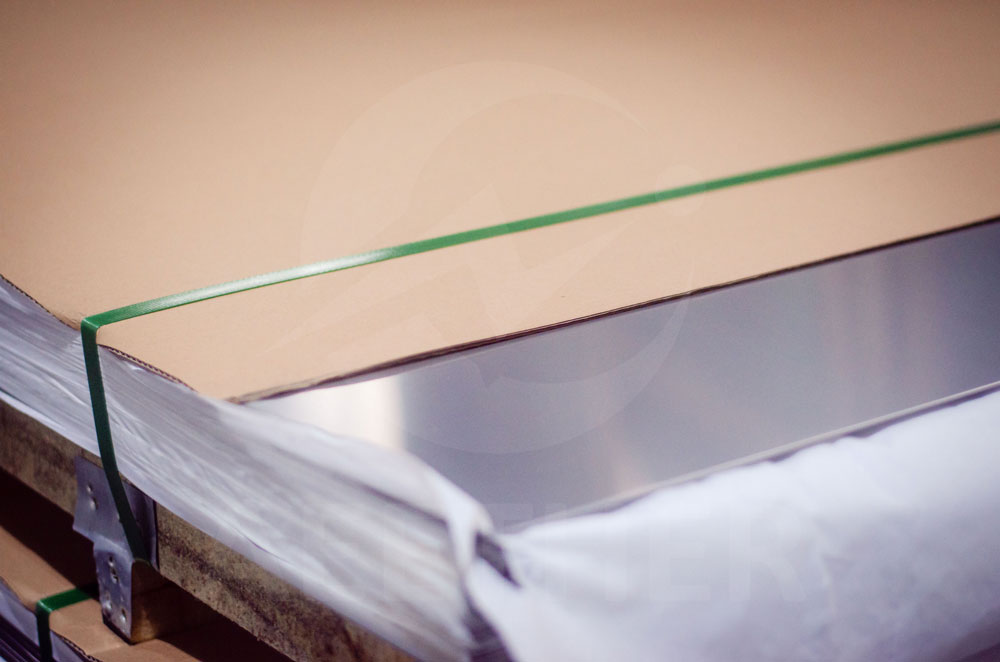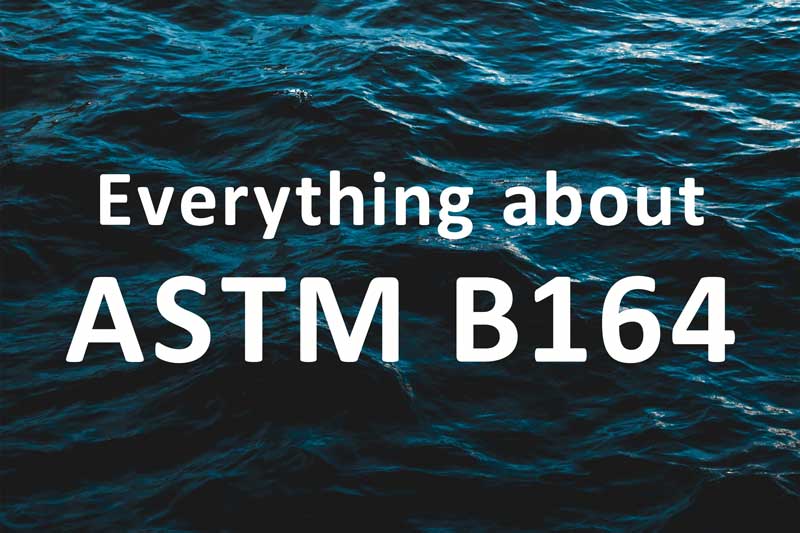Everything You need to Know about ASTM B575
Overview
ASTM B575 standard mainly includes sheets of various low-carbon nickel-chromium-molybdenum alloys. The standard specifies all aspects that should be paid attention to during the production of the material. In this article, we will explain in detail the key points that need to be paid attention to in the standard, so that you can avoid all kinds of troubles in the purchasing process more smoothly.
Grades & Chemical Composition
Grades
The scope of ASTM B575 mainly includes low-carbon nickel-chromium-molybdenum alloys. Low carbon is mainly used to improve the durable properties of the alloy. The elements of nickel, chromium and molybdenum ensure the oxidation resistance and reduction resistance of the alloy. These alloys tend to have excellent overall corrosion resistance properties.
In some of these alloys, in addition to nickel, chromium, and molybdenum, other strengthening elements have been added. For example, copper in nickel-chromium-molybdenum-copper alloy (Hastelloy C-2000) further improves the corrosion resistance of the alloy. The tungsten element in nickel-chromium-molybdenum-tungsten alloy (Inconel 686) provides better localized corrosion resistance.
Chemical Composition
Inconel 686 (UNS N06686)
686
Mn
W
Mo
Fe
Cr
Ni
Hastelloy C-4 (UNS N06455)
C-4
Mn
Ti
Co
Fe
Mo
Cr
Ni
Hastelloy C-22 (UNS N06022)
C-22
Co
V
W
Fe
Mo
Cr
Ni
Hastelloy C-276 (UNS N10276)
C-276
Mn
Co
V
W
Fe
Mo
Cr
Ni
Hastelloy C-2000 (UNS N06200)
C-2000
Al
Cu
Co
Fe
Mo
Cr
Ni
Hastelloy G-35 (UNS N06035)
G-35
Si
Al
Co
V
W
Fe
Mo
Cr
Ni
Suppliers shall perform chemical analysis of the material in accordance with ASTM B906.
Product Properties
Products in ASTM B575

 Inconel 686
Inconel 686 Sheet
 Hastelloy C-4
Hastelloy C-4 Sheet
 Hastelloy C-22
Hastelloy C-22 Sheet
 Hastelloy C-276
Hastelloy C-276 Sheet
 Hastelloy C-2000
Hastelloy C-2000 Sheet
 Hastelloy G-35
Hastelloy G-35 Sheet

 Inconel 686
Inconel 686 Plate
 Hastelloy C-4
Hastelloy C-4 Plate
 Hastelloy C-22
Hastelloy C-22 Plate
 Hastelloy C-276
Hastelloy C-276 Plate
 Hastelloy C-2000
Hastelloy C-2000 Plate
 Hastelloy G-35
Hastelloy G-35 Plate
ASTM B575 specifies four product forms: sheet, plate, coil and strip. Among them, the sheet is mainly produced by the process of cold rolling, and the wall thickness is relatively thin. Plate is produced by a hot rolling process with thicker walls. Strip is also produced by cold rolling, but in narrower widths and is supplied in coil form.
Mechanical Properties
| Alloy | Tensile Strength, min, psi (MPa) |
Yield Strength (0.2 % Offset), min, psi (MPa) |
Elongation in 2 in. (50.8 mm) or 4D min, % |
Rockwell Hardness, max |
|---|---|---|---|---|
| Hastelloy C-276 (N10276) | 100 000 (690) | 41 000 (283) | 40 | 100 HRB |
| Hastelloy C-22 (N06022) | 100 000 (690) | 45 000 (310) | 45 | 100 HRB |
| Hastelloy C-4 (N06455) | 100 000 (690) | 40 000 (276) | 40 | 100 HRB |
| Hastelloy G-35 (N06035) | 85 000 (586) | 35 000 (241) | 30 | 100 HRB |
| N06058 | 110 000 (760) | 52 000 (360) | 40 | 100 HRB |
| N06059 | 100 000 (690) | 45 000 (310) | 45 | 100 HRB |
| Hastelloy C-2000 (N06200) | 100 000 (690) | 45 000 (310) | 45 | 100 HRB |
| N10362 | 105 000 (725) | 45 000 (310) | 40 | 100 HRB |
| Inconel 686 (N06686) | 100 000 (690) | 45 000 (310) | 45 | 100 HRB |
| N06210 | 100 000 (690) | 45 000 (310) | 45 | 100 HRB |
The alloys in ASTM B575 all contain molybdenum, so they tend to have relatively higher strengths. Among them, strips can more precisely control the mechanical properties and hardness of the material through the combination of cold rolling and heat treatment.
Delivery State
The ASTM B575 standard does not specify the delivery state of the material. In general, the material should be delivered in the annealed or solution treated state.
Other Information
Dimension
Tolerance requirements for materials are not directly listed in ASTM B575. But the standard specifies that the tolerances of the material should be in accordance with ASTM B906. (see tables below)


| Specified Thickness, in. (mm) |
Permissible Variations in Thickness, in. (mm) |
|
|---|---|---|
| + | - | |
| 3/16 to 7/32 (4.762 to 5.556), incl | 0.021 (0.53) | 0.010 (0.25) |
| Over 7/32 to 1/4 (5.556 to 6.350), incl | 0.024 (0.61) | 0.010 (0.25) |
| Over 1/4 to 3/8 (6.350 to 9.525), incl | 0.027 (0.69) | 0.010 (0.25) |
| Over 3/8 to 1/2 (9.525 to 12.70), incl | 0.030 (0.76) | 0.010 (0.25) |
| Over 1/2 to 5/8 (12.70 to 5.88), incl | 0.035 (0.89) | 0.010 (0.25) |
| Over 5/8 to 3/4 (15.88 to 19.05), incl | 0.040 (1.02) | 0.010 (0.25) |
| Over 3/4 to 7/8 (19.05 to 22.25), incl | 0.045 (1.14) | 0.010 (0.25) |
| Over 7/8 to 1 (22.25 to 25.4), incl | 0.050 (1.27) | 0.010 (0.25) |
| Over 1 to 2 1/2 (25.4 to 63.5), incl | 5 | 0.010 (0.25) |
| Specified Thickness, in. (mm) |
Permissible Variations in Thickness, in (mm) (All Widths) |
|||||
|---|---|---|---|---|---|---|
| + | - | |||||
| 0.020 to 0.034 (0.51 to 0.86), incl |
0.004 (0.10) | 0.004 (0.10) | ||||
| Over 0.034 to 0.056 (0.86 to 1.42), incl |
0.005 (0.13) | 0.005 (0.13) | ||||
| Over 0.056 to 0.070 (1.42 to 1.78), incl |
0.006 (0.15) | 0.006 (0.15) | ||||
| Over 0.070 to 0.078 (1.78 to 1.98), incl |
0.007 (0.18) | 0.007 (0.18) | ||||
| Over 0.078 to 0.093 (1.98 to 2.36), incl |
0.008 (0.20) | 0.008 (0.20) | ||||
| Over 0.093 to 0.109 (2.36 to 2.77), incl |
0.009 (0.23) | 0.009 (0.23) | ||||
| Over 0.109 to 0.125 (2.77 to 3.18), incl |
0.010 (0.25) | 0.010 (0.25) | ||||
| Over 0.125 to 0.140 (3.18 to 3.56), incl |
0.013 (0.33) | 0.010 (0.25) | ||||
| Over 0.140 to 0.171 (3.56 to 4.34), incl |
0.016 (0.41) | 0.010 (0.25) | ||||
| Over 0.171 to 0.187 (4.34 to 4.75), incl |
0.018 (0.46) | 0.010 (0.25) | ||||
| Specified Thickness | Permissible Variations in Widths and Lengths for Dimensions Given, in. (mm) | |||||||||
|---|---|---|---|---|---|---|---|---|---|---|
| Up to 30 (760), incl | Over 30 (760) | |||||||||
| + | - | + | - | |||||||
| Inches | ||||||||||
| Sheared: | ||||||||||
| 3/16 to 5/16, excl | 3/16 | 1/8 | 1/4 | 1/8 | ||||||
| 5/16 to 1/2, incl | 1/4 | 1/8 | 3/8 | 1/8 | ||||||
| Abrasive-cut: | ||||||||||
| 3/16 to 1 1/2, incl | 1/16 | 1/16 | 1/16 | 1/16 | ||||||
| Over 1 1/2 to 2 1/2, incl | 1/8 | 1/8 | 1/8 | 1/8 | ||||||
| Plasma torch-cut: | ||||||||||
| 3/16 to 2 excl | 1/2 | 0 | 1/2 | 0 | ||||||
| 2 to 3 incl | 5/8 | 0 | 5/8 | 0 | ||||||
| Millimetres | ||||||||||
| Sheared: | ||||||||||
| 4.76 to 7.94, excl | 4.76 | 3.18 | 6.35 | 3.18 | ||||||
| 7.94 to 12.70, incl | 6.35 | 3.18 | 9.52 | 3.18 | ||||||
| Abrasive-cut: | ||||||||||
| 4.76 to 38.1, incl | 1.59 | 1.59 | 1.59 | 1.59 | ||||||
| Over 38.1 to 63.5, incl | 3.18 | 3.18 | 3.18 | 3.18 | ||||||
| Plasma torch-cut: | ||||||||||
| 4.8 to 50.8 excl | 12.7 | 0 | 12.7 | 0 | ||||||
| 50.8 to 76.2 incl | 15.9 | 0 | 15.9 | 0 | ||||||
| Specified Thickness, in. (mm) | Specified Width, in. (mm) | Permissible Variations in Specified Width, in. (mm) | |
|---|---|---|---|
| + | - | ||
| Sheet | |||
| 0.187 (4.76) and under | 2 (50.8) and over | 0.125 (3.18) | 0 |
| Strip (Slit Edges) | |||
| Over 0.020 to 0.075 (0.51 to 1.90), incl | 24 (610) and under | 0.007 (0.18) | 0.007 (0.18) |
| Over 0.075 to 0.100 (1.90 to 2.54), incl | 24 (610) and under | 0.009 (0.23) | 0.009 (0.23) |
| Over 0.100 to 0.125 (2.54 to 3.18), incl | 24 (610) and under | 0.012 (0.30) | 0.012 (0.30) |
Edge
Plates shall have sheared or cut (machined, abrasive cut, powder cut, or inert arc cut) edges, as specified. Sheet and strip shall have sheared or slit edges.
Average Grain Size
For annealed sheets, the standard specifies the average grain size of the material. The grain size of sheets with thickness below 3.175mm should be controlled at ASTM No.3 or finer. Sheets with a thickness of more than 3.175mm should reach the grain size of ASTM No.1.5 or finer.
Other Requirements
The edgewise curvature (depth of chord) of flat sheet, strip, and plate shall not exceed 0.05 in. (1.27 mm) multiplied by the length in feet or 0.04 mm multiplied by the length in centimetres. Straightness for coiled strip is subject to agreement between the manufacturer and the purchaser.
For sheets of all thicknesses and widths of 6 in. (152.4 mm) or more, the angle between adjacent sides shall be 90±0.15°
Plate, sheet, and strip shall be commercially flat.
Certification
The supplier should provide the material test certificate corresponding to the material before shipment. The certificate should contain customer information, supplier information, standard, delivery state, grade, product form, size, heat number, mechanical properties and chemical composition. In addition, the supplier should reflect the performance of the material on the certificate as much as possible.
Conclusion
ASTM B575 is a very commonly used standard. Materials include the main nickel-chromium-molybdenum alloys. These alloys have very good overall corrosion resistance. Product forms include sheet, plate, coil and strip. The standard clearly specifies the chemical composition, mechanical properties and dimensional requirements of the material.
We manufacture the materials in it strictly according to ASTM B575. If you have purchasing needs, please do not hesitate to contact us.













